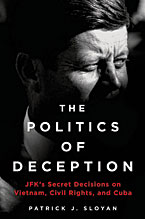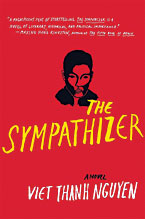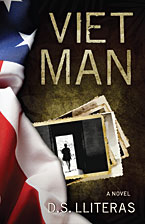 |
||||||||||||
|
Books in Review, May/June 2015 JFK and the Diem Assassination: REVIEWS BY MARC LEEPSON AND DAVID WILLSON
Despite his regime’s long, abysmal record of trampling on the basic rights of its citizens, the United States supported Diem with large amounts of financial aid and increasing numbers of American military advisors. The main reason: Diem’s success in fighting the communist insurgent movement. But American support for Diem began to erode significantly in 1963 when his regime brutally cracked down on Buddhist monks protesting the regime’s policies. In the summer of that year, the Kennedy administration put in motion a plan that would allow a group of South Vietnamese generals to overthrow Diem and Nhu. A new military regime, it was hoped, would continue fighting the Viet Cong but without the political excesses of the Ngo brothers. The U.S. had hoped that Diem and Nhu would go into exile and that a new, competent, and popular leader would emerge. None of that happened. Instead, the brothers were assassinated, the generals who took over were astonishingly incompetent, and the Viet Cong insurgency continued. The chaos in the aftermath of the Diem assassination started the dominos that led to the 1965 buildup of American combat forces. In short, nothing in South Vietnam was the same after the Diem assassination. Patrick J. Sloyan, an award-winning journalist, takes a close look at the 1963 Diem debacle in The Politics of Deception: JFK’s Secret Decisions on Vietnam, Civil Rights, and Cuba (Thomas Dunne Books, 308 pp., $26.99). Sloyan, in a nutshell, reports that JFK let himself be duped and misled by senior advisers—most importantly, Averill Harriman and Roger Hillsman of the State Department and newly appointed U.S. Ambassador to South Vietnam Henry Cabot Lodge—into backing what other policymakers presciently predicted would be a debacle. Sloyan does an excellent job making that case, using many sources, including recently released White House tape recordings of the deliberations that went into the planning of the regime change. In doing so, however, he minimizes the excesses of the Diem regime (does the term “tiger cages” ring a bell?), and greatly exaggerates Diem’s strengths. Sloyan, for example, touts “the popular approval outside of Saigon for Diem’s honesty, dedication, and celibacy, and the economic vitality that Diem fostered for nine years.” It’s a stretch to say that a repressive dictator was popular among his people. And although Diem may have been personally honest, his regime was replete with dishonest (and non-celibate) officials. Sloyan also diminishes his argument by castigating a small group of anti-establishment war correspondents who, he claims, were “resentful of the policies of Diem” (primarily David Halberstam of The New York Times) and wound up fatally sabotaging Diem by writing deliberate mistruths about the Buddhist uprising and the regime’s policies. While JFK railed against Halberstam’s “one-sided” reporting, it strains credibility to believe that a handful of New York Times articles significantly influenced the White House and State Department to dump Diem. Then there’s Sloyan’s contention that Halberstam “and other Western journalists” knowingly misreported the percentage of Buddhists in South Vietnam. The statistic most often reported was that 70-80 percent of the country were Buddhists. That figure is an important one because Diem and virtually all the leaders of the country were Catholic. Sloyan quotes pro-Diem former U.S. Ambassador Eldridge Durbrow saying that Vietnam “never has been a Buddhist country,” and that only about ten percent of the population was Buddhist. Although there are no easily confirmed statistics, most observers have estimated that 50-80 percent of the population of South Vietnam identified themselves as Buddhists in the 1960s. The Encyclopedia of the Vietnam War, for example, notes: “In the mid-1960s only 3 million Vietnamese considered themselves active Buddhists, but 15 million, or 80 percent of the population, were nominally associated with the religion.” Sloyan has only good things to say about the Diem regime’s discredited Strategic Hamlet Program, which forcefully relocated thousands of rural Vietnamese from 1961-64 into heavily fortified hamlets. Sloyan calls the program, which was run by Ngo Dinh Nhu, “an important obstacle to the Viet Cong.” Nearly every other observer has reported that the program bred corruption, did little to halt the VC, and turned tens of thousands of South Vietnamese against their government. The media bias, Buddhist estimate questions, and Strategic Hamlet assessment aside, Sloyan’s book is a worthy addition to the canon of early American Vietnam War history. It’s well and clearly written, well researched, contains new information, and sheds instructive and disturbing light on the Kennedy administration’s ill-informed and ill-fated decision to support the overthrow of a flawed ally. —M.L.
Karl Marlantes, the author of the Vietnam War novel Matterhorn, says that Viet Thanh Nguyen’s new novel, The Sympathizer (Grove Atlantic, 284 pp., $26), is “easy to read, wry, ironic, wise, and captivating.” I agree. The book’s narrator, the unidentified “sympathizer” of the title, grabbed me with his voice and attitude. Plus, if he hadn’t already gotten my attention, his ironic comment about “the awfulness of Jane Fonda” won me over. I loved the irony of a Vietnamese-American saying that. And it was funny, although in a very dark manner. If a book about the Vietnam War is funny, it would have to be in a dark manner. The main character’s voice, wit, and point of view make the book a total delight, especially if you are interested in the Vietnam War. There is a witty turn of phrase on just about every page. That includes this observation about American excess: “a sheet cake big enough to sleep on.” There is a brilliant section in which the protagonist is an adviser for a big-budget Vietnam War film in the Philippines, a movie that resembles Apocalypse Now in virtually every respect. The delineation of the megalomaniac director is a nonstop hoot, as well as a critique of all that is wrong when America confronts things “Oriental.” The author pays tribute to Sgt. Rock, dusty cans of Spam, Tarzan, dog eating, the Phoenix Program, hippies, Sophia Loren, John Wayne, Bob Hope, Agent Orange, getting outta Dodge, Alice in Wonderland, and many phrases and themes associated with the Vietnam War. He also comes up with a bunch of new ones: arthritic turtles, the Chinese acrobat of time, skunked by history, just to pick three good ones. For those who have been waiting for the great Vietnamese-American Vietnam War novel, this is it. More to the point: This is a great American Vietnam War novel. I enjoyed every page of it. It is the last word (I hope) on the horrors of the Vietnamese re-education camps that our allies were sentenced to when we left them swinging in the wind. If the author wanted me to feel overwhelming guilt, he succeeded mightily. —D.W.
|
||||||||||||
|
|
||||||||||||
|
||||||||||||
8719 Colesville Road, Suite 100, Silver Spring. MD 20910 | www.vva.org | contact us |
||||||||||||














